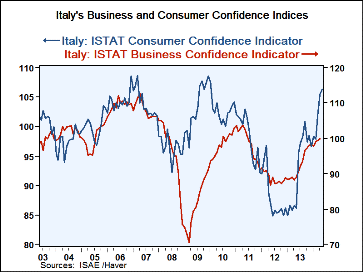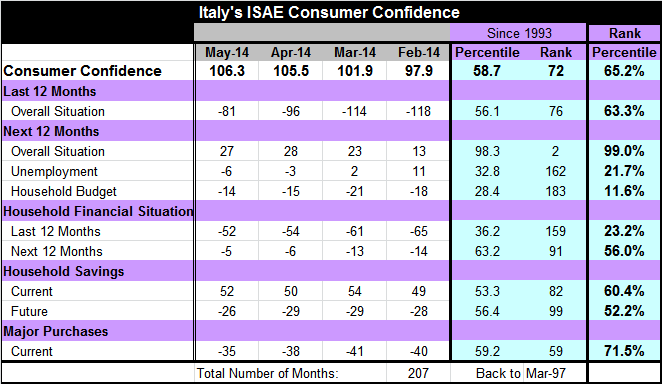 Global| May 27 2014
Global| May 27 2014Italian Consumer Confidence Jumps to 4-Year High
Summary
Consumer confidence in Italy rose to 106.3 in May from 105.5 in April. This is the strongest reading since 2010. The three-month rise in the index is 8.4 points, which is the fifth highest three-month gain since November 1989. The [...]
 Consumer confidence in Italy rose to 106.3 in May from 105.5 in April. This is the strongest reading since 2010. The three-month rise in the index is 8.4 points, which is the fifth highest three-month gain since November 1989. The improvement in Italian consumer confidence over the last three months has been remarkable. The chart shows that consumer confidence is making it second leg of recovery, since it floundered at abysmally low levels in 2012 and part of 2013. Business confidence has been increasing over the same horizon, albeit at a much slower pace.
Consumer confidence in Italy rose to 106.3 in May from 105.5 in April. This is the strongest reading since 2010. The three-month rise in the index is 8.4 points, which is the fifth highest three-month gain since November 1989. The improvement in Italian consumer confidence over the last three months has been remarkable. The chart shows that consumer confidence is making it second leg of recovery, since it floundered at abysmally low levels in 2012 and part of 2013. Business confidence has been increasing over the same horizon, albeit at a much slower pace.
Despite the huge jump in confidence, the Italian index sits only in the 65th percentile of its historic ranking of observations. This rise brings the reading up to a more moderate level, although it is still somewhat weak.
The overall situation in the last 12 months is assessed at a raw score of -81 in May, compared to -96 in April. This moves the ranking up to 63rd percentile.
Substantially boosting the index, the overall situation for the next 12 months is at a score of 27 in May; that's a back-off from 28 in April but it's one of the highest readings historically, standing in the top one percentile of its historic queue.
The outlook over the next 12 months for unemployment has fallen to -6 in May from -3 in April. This leaves the prospect of unemployment and about the bottom fifth of its historic queue.
Household budget rating improved slightly to -14 from -15. However, it is still in very sad shape, floundering in the bottom 11% of its historic queue of data.
The household financial situation over the last 12 months improved slightly to -52 from -54, but it still sits in the 23rd percentile of its historic queue. The outlook for the financial situation over the next 12 months also improved to -5 in May from a -6 reading in April. This reading sits in the 56th percentile of its historic queue. While the household financial situation has been fairly grim, the outlook is that it will return to something that is in the top half of the historic queue of responses.
Household savings prospects in the current period are believed to have improved to 52 from a level of 50, leaving it in the 60th percentile historically. However, the prospect for savings in the future, while improving to -26 from -29, sits only in its historic 52nd percentile, barely better than it has been half of the time.
The assessment of the prospect to make major purchases in the current period improved to -35 in May from -38 in April. That boosted this reading to the 71st percentile of its historic queue, making it the second-highest percentile standing among the various responses.
The improvement in the May consumer confidence data for Italy corresponds with more modest increases in confidence by its industrial sector. These readings are improving in the face of difficult geopolitical conditions in Europe as the strife in Ukraine is still at full boil. The survey was concluded ahead of the voting for the European Parliament, an election result that has brought a greater weight to those registering dissent about the way the union has been run. Italy's economy has continued to decline during this period and its PMI readings for manufacturing and services continue to be moderate but also continue to show improvement. The rationale for a sharp improvement - ongoing improvement - in consumer confidence is therefore somewhat difficult to pin down.

Robert Brusca
AuthorMore in Author Profile »Robert A. Brusca is Chief Economist of Fact and Opinion Economics, a consulting firm he founded in Manhattan. He has been an economist on Wall Street for over 25 years. He has visited central banking and large institutional clients in over 30 countries in his career as an economist. Mr. Brusca was a Divisional Research Chief at the Federal Reserve Bank of NY (Chief of the International Financial markets Division), a Fed Watcher at Irving Trust and Chief Economist at Nikko Securities International. He is widely quoted and appears in various media. Mr. Brusca holds an MA and Ph.D. in economics from Michigan State University and a BA in Economics from the University of Michigan. His research pursues his strong interests in non aligned policy economics as well as international economics. FAO Economics’ research targets investors to assist them in making better investment decisions in stocks, bonds and in a variety of international assets. The company does not manage money and has no conflicts in giving economic advice.
More Economy in Brief
 Global| Feb 05 2026
Global| Feb 05 2026Charts of the Week: Balanced Policy, Resilient Data and AI Narratives
by:Andrew Cates






